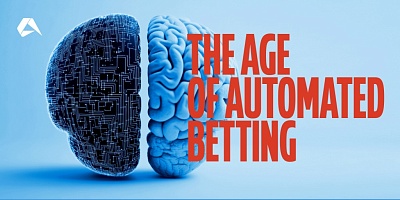Altenar, a sportsbook software provider, has a growing and budding interest in the applications of Artificial Intelligence within the sports betting industry and how this can improve the end-user experience, report building, content streaming and much, much more.
There is plenty of chatter around the tech industries about the potential benefits of AI-powered predictive analytics and how this could change the future of the online sports betting industry, which is heavily reliant on large data sets and learning, understanding and applying the outcomes into products and services.
Predictive analytics may be used in practically every aspect of an organisation's operations, especially within the sports betting industry where AI becomes more relevant daily, additionally, the possibilities are endless. Fr om customer interactions, financial transactions (for example, to predict instances of money laundering), production (handling large data sets, tracking problem players and more), and many other use cases can all benefit fr om the application of machine learning models.
AI Predictive Analytics is a branch of Artificial Intelligence (AI) that deals with the use of statistical algorithms and machine learning models to identify the likelihood of future outcomes based on historical data. It is used to make data-driven predictions about future trends, events, and behaviours to support decision-making and help businesses optimise their operations.
For sports betting and the iGaming industry as a whole, AI-powered predictive analytics could be a game changer when it comes to data analytics.
Let’s take a look at the potential of predictive analytics in the sports betting industry and whether this could be the next step on the data analytics journey…
Potential Benefits AI Predictive Analytics | Altenar & Artificial Intelligence
As a sportsbook software provider, Altenar handles inordinate volumes of data daily and as the brand grows globally the number of bets, players and operators using the customisable sports betting solutions and platforms reach new heights.
With strong data analytics and AI-focused teams, Altenar has been progressively using, learning and applying AI models into its sportsbook solutions that have helped the provider’s ability to build reports, track player behaviour and greater customisation to its product and services. You can discover more about Altenar’s data aims here.
-Improved decision-making: AI-powered predictive analytics can provide insights and forecasts to support data-driven decision-making.
-Enhanced accuracy: Predictive models trained with AI can have higher degrees of accuracy, potentially compared to traditional statistical models.
-Automation: Automated predictive analytics reduces the time/effort required to gather, analyse, and interpret data.
-Better customer insights: AI-powered predictive analytics can help betting providers and operators to better understand their customers; personalise offerings and improve customer experience.
-Predictive maintenance: Predictive analytics can help iGaming businesses identify potential issues before they occur, potentially establishing proactive maintenance actions and reducing downtime.
-Fraud detection: AI-powered predictive analytics can help sports betting providers and operators detect and prevent fraudulent activities, allowing them to minimise financial losses and improve security.
What Are The Overall Benefits Of AI Predictive Analytics
As companies within the online betting industry are actively looking at the potential of AI-powered predictive analytics as a future solution to automated data analysis, it’s prudent to take a look at the benefits of predictive analytics within an organisation.
The benefits of AI predictive analytics are potentially inordinate and can include:
-Improved decision-making: predictive analytics provides organisations within the iGaming industry with data-driven insights that can inform decision-making and improve outcomes.
-Increased efficiency: By automating data processing and analysis, predictive analytics can save providers and operators time and resources while improving accuracy which could allow these providers to pioneer and drive other much-needed technologies.
-Optimisation: predictive analytics can help companies like Altenar, a sportsbook software provider, optimise operations, and improve resource allocation, all the while increasing profitability.
-Competitive advantage: Leveraging AI predictive analytics better positions iGaming businesses to compete in their industry by making data-driven decisions that can drive growth and success.
These are just a peek behind the sports betting curtain on how AI-powered predictive analytics could bolster an iGaming operation, solutions and platforms. The question of whether this technology and way of consuming and understanding data could be the future of sports betting is still uncertain, however, there’s definite potential for predictive analytics once the technology has developed further.
You can discover how Altenar is applying AI and machine learning models by visiting the sportsbook provider’s blog.
What Industries Can AI Predictive Analytics Be Used In
Though this article aims to detail how and wh ere AI predictive analytics can be applied to the sports betting and iGaming industry, it’s vital to show the other industries where this technology and process can have an instrumental impact.
AI Predictive Analytics has numerous applications across a host of industries and sectors, including:
-Healthcare: Predictive analytics could be used to predict disease outbreaks, predict patient outcomes, and optimise resource allocation.
-Retail: Predictive analytics can help retailers optimise inventory management, as well as, personalise marketing campaigns, and improve the customer experience.
-Finance: Predictive analytics can help banks and financial institutions: detect fraudulent activity, predict credit risk, and optimise investment strategies.
-Sports betting: Helping to improve odds calculation, identify betting patterns, and inform decision-making in the sports betting industry.
-Manufacturing: Optimising production processes, predicting equipment failures, and improving supply chain management.
With far-reaching applications and potential, it’s possible that AI predictive analytics could become an industry standard across a plethora of industries, especially within the sports betting sphere.
As operating countries become increasingly regulated, predictive analytics could offer extra security to already highly-regulated countries… If you’re an operator looking to start your sportsbook venture you can discover Altenar’s territories here, where the sports betting software provider holds a host of must-have certifications and licences.
What Are The Benefits Of AI Predictive Analytics In Online Sports Betting | Altenar & Artificial Intelligence
As a sportsbook software provider, Altenar takes a look at how predictive analytics could add greater value to the sports betting industry as a whole, and vastly increase any future potential, products and services created in the betting landscape.
Traditionally, sports betting has had a proclivity for not only moving with the times but defining them. After taking a mobile-first approach in the early 90s and adopting newer technologies into its solutions and products.
With a host of technically minded professionals at the helm of the sports betting industry, it seemed like only a matter of time before the industry looked at applying AI predictive analytics.
Let’s take a look at some of the benefits of the sports betting industry.
-Improving odds calculation: Analyse historical data on teams, players, and events to provide more accurate odds.
-Identifying betting patterns: Analyse betting behaviour to identify patterns and trends, which can inform better decision-making and help operators institute more effective responsible gambling tools.
-Informing decision-making: This can help operators decide which events to offer bets on and what odds to set.
-Enhancing risk management: identifying potential risks and vulnerabilities in the betting process is a must and something that is a point of continual work and adaptation to new risks. AI predictive analytics allows companies to proactively manage these risks.
-Optimising promotions and bonuses: Betting companies can optimise promotions and bonuses based on betting behaviour and bettor demographics.
You can discover what Altenar’s sportsbook solution offers to an operator’s players by contacting the award-winning solutions provider now!
What’s The Difference Between AI & Predictive Analytics
AI refers to the development of computer systems that can perform autonomous tasks, such as visual perception, speech recognition, decision-making, and language translation.
The most glaring difference between AI and predictive analytics is that AI can be autonomous and learn on its own. On the other hand, predictive analytics often relies on human interaction to help query data, identify trends, and test assumptions, though it can also use ML in certain circumstances. Because of this, AI has a much broader scope of applications than predictive analytics.
AI is completely autonomous while predictive analytics relies on human interaction to query data, identify trends, and test assumptions.
AI solutions are tailored to replicate human behaviour, thinking, speech, or vision. These solutions are widely implemented today to automate, facilitate, accelerate, and enhance various processes.
Predictive analytics is the branch of the advanced analytics used to make predictions about unknown future events; it tends to analyze historical data and predict the outcomes or give recommendations that can help business owners improve service.
What are the main types of data analytics and how will predictive analytics change this?
As a sportsbook solutions provider that applies, builds, handles and uses large data sets at any given time, it’s important to briefly outline the kinds of data analytics in the world and how this could potentially differ fr om predictive analytics.
Are you interested in Altenar’s success stories with Big Data and data analytics? Click here.
To discover the different types of data analytics and their potential in sports betting, continue reading …
There are several main types of data analytics, including:
-Descriptive Analytics: Summarising and describing data, often using visualisations and reports. It provides a snapshot of past events and trends.
-Diagnostic Analytics: Focuses on why past events and trends happened. It provides a deeper understanding of any underlying factors that contribute to outcomes.
-Predictive Analytics: Uses statistical algorithms and machine learning models to analyse historical data and predict future outcomes.
-Prescriptive Analytics: Recommends and suggests potential solutions to problems based on data analysis.
Potentially, predictive analytics is changing the way data analytics is performed by providing a more forward-looking and proactive approach to decision-making.
Predictive Analytics allows sports betting businesses to make data-driven predictions about future trends, behaviours, and events, which can inform decision-making and optimise operations.
Additionally, predictive analytics is seeing use in conjunction with other types of data analytics: Descriptive Analytics and Diagnostic Analytics.
Could AI-Powered Predictive Analytics Bridge The ‘Insights Gap’
The "Insights Gap" refers to the challenge of turning data into actionable insights that can inform decision-making and drive better outcomes. Altenar, a sportsbook software provider, is looking into how predictive analytics could potentially bridge the gap that has existed within data analytics since its inception.
What factors cause the ‘Insight Gap’:
-Data overload: The sheer volume of data available can make it difficult to identify the most relevant information.
-Data quality: Poor quality data can lim it the accuracy of insights and compromise decision-making.
-Data silos: Data may be stored in separate systems and departments, making it difficult to access and integrate.
-Skills gap: There may be a shortage of professionals with the skills and expertise needed to effectively analyse data and derive insights.
-Resistance to change: Organisational resistance to change and the adoption of new technologies and methods can lim it the effectiveness of data analytics.
To bridge the Insights Gap, businesses within the sports betting industry and other sectors need to invest in data-driven strategies and technologies and develop a culture of data-driven decision-making that values the insights generated by data analysis.
A demonstration of supporting and implementing a culture of data-driven decision-making can be seen in Altenar’s product and feature releases in recent years. You can discover a handful of these achievements by reading Altenar’s all-hands-meeting article.
Additionally, companies within the iGaming industry need to build the necessary infrastructure and invest in the skills and expertise needed to effectively analyse data and derive insights, which has become a must-have.
What Are The Potential Negative Impacts Of AI-Powered Predictive Analytics
It seems only fair to take a look at the figurative ‘flip side’ of the predictive analytics coin. Though there are inordinate potentials for the technology and an increasing likelihood that AI predictive analytics will see greater usage in the sports betting and iGaming industry.
So, while predictive analytics has many potential benefits, there are also potential negative effects that should be considered:
-Bias: the potential to perpetuate and amplify existing biases in the data which could lead to unfair and discriminatory outcomes.
-Lack of transparency: Being potentially complex and difficult to understand could make assessing the accuracy and reliability of predictions difficult.
-Privacy concerns: Needing to involve the collection and analysis of large amounts of personal data concerns could be raised around privacy and security concerns.
-Dependence on data quality: Needing high-quality data to be effective, any data that is inaccurate could cause the predictions to be inaccurate.
-Unintended consequences: The potential for unintended consequences, such as predicting outcomes that were not intended.
-Over-Reliance on predictions: Predictive models are designed to provide insights and support decision-making. Relying solely on these models as the source of information could be a poor choice.
With all of these points to consider, Altenar, a sportsbook software provider, looks forward to the exploration of this technology and model as it moves forward into the future of many sectors.
Discover more about Altenar today by contacting the tier-one provider now!













